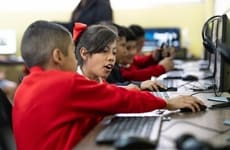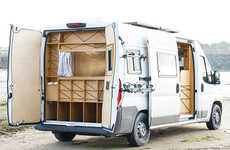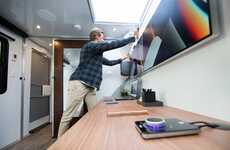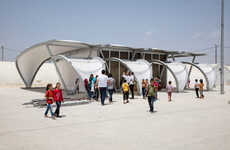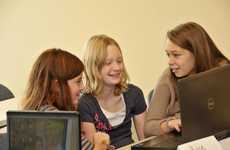
This Mobile Classroom is Designed to Promote Digital Literacy
Katherine Pendrill — December 17, 2015 — Eco
References: close-the-gap.org & psfk
The 'Digi-Truck' is a mobile classroom that is designed to promote digital literacy. Despite how connected we are, there are many places in the world that still lack the infrastructure to support digital communication. This classroom travels to remote areas to give children an opportunity to learn more about new technology.
The Digi-Truck is the result of a joint partnership between Close the Gap, Arrow Electronics and Hoops for Hope. The classroom is contained inside an old shipping container, which is outfitted with solar panels. The solar panels help to power the equipment inside even when there is no other electricity source available. As a result, the truck is able to run 20 laptops, a LED screens, two routers and even a printer.
The goal of the truck is to promote digital literacy by giving kids access to technology they might not otherwise have. As the founded of Close the Gap Oliver Vanden Eynde explains, the Digi-Truck is designed "to help bridge this digital divide and to bring quality training and education to remote communities."
The Digi-Truck is the result of a joint partnership between Close the Gap, Arrow Electronics and Hoops for Hope. The classroom is contained inside an old shipping container, which is outfitted with solar panels. The solar panels help to power the equipment inside even when there is no other electricity source available. As a result, the truck is able to run 20 laptops, a LED screens, two routers and even a printer.
The goal of the truck is to promote digital literacy by giving kids access to technology they might not otherwise have. As the founded of Close the Gap Oliver Vanden Eynde explains, the Digi-Truck is designed "to help bridge this digital divide and to bring quality training and education to remote communities."
Trend Themes
1. Mobile Classroom Solutions - Opportunity to create innovative mobile classrooms with the use of solar panels to provide education to remote communities.
2. Digital Literacy Promotion - Creating digital literacy programs for remote areas via mobile classrooms utilizing renewable technologies.
3. Alternative Energy in Education - Opportunity to incorporate solar panels and other renewable technologies to power education and learning
Industry Implications
1. Education and Training - Incorporating innovative mobile classrooms to provide quality education to remote communities.
2. Renewable Energy - Developing sustainable ways through solar panels and other renewable technologies to power mobile classrooms and education.
3. Technology and Electronics - Creating innovative digital literacy solutions for remote areas utilizing modern technology, such as laptops, LED screens and routers.
4.2
Score
Popularity
Activity
Freshness

